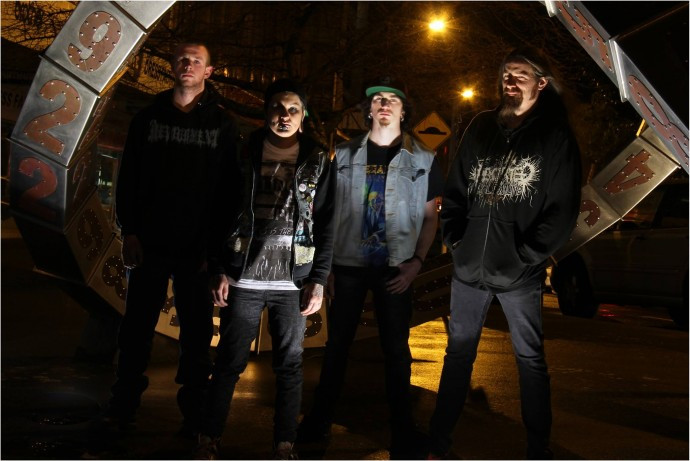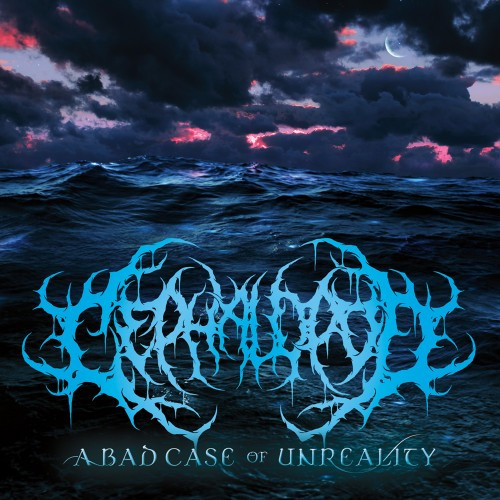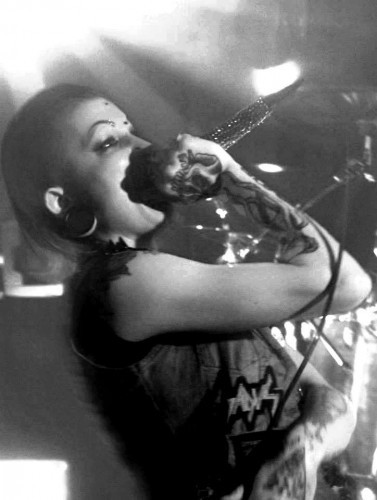(We welcome back New Zealand-based metal writer and broadcaster Craig Hayes, who brings us this interview with Elise Gregg-Schofield of New Zealand’s Cephalopod, whose new EP was released this summer.)
Losing the primary songwriter from any band often means the demise of said band is sure to follow. However, although New Zealand metal band Cephalopod lost one of its key founding members a few years back, the group has ended up making a giant compositional leap on their new EP, A Bad Case of Unreality. The band’s last release, 2012’s Materialization, featured plenty of high-energy thrash mixed with vocalist Elise Gregg-Schofield’s howls. But when it came time to record A Bad Case of Unreality, Cephalopod clearly had a whole new set of goals.
Not only is A Bad Case of Unreality is more complex and adventurous release than Cephalopod’s previous EP, but Gregg-Schofield’s vocals are far more dynamic, too. Far from sounding like a band recovering from the exit of a key songwriter, A Bad Case of Unreality finds Cephalopod revelling in new energy and renewed enthusiasm. The EP sees Cephalopod inject intense layers of intricacy into ten-tonne pandemonium on “Ape Brain” and “Loose Teeth”.\, while “Blue and Righteous” and “A Bad Case of Unreality” dig into brutal technical mayhem like Cephalopod have never done before.
All up, A Bad Case of Unreality presents a band that’s free to experiment with a wider range of influences and creative inspirations. No Clean Singing recently caught up with Cephalopod vocalist Gregg-Schofield to discuss A Bad Case of Unreality, and those changes in the band’s sound and attitude.
Congratulations on Cephalopod’s new EP. Before we dive into that cauldron of riffs, let’s talk a little about your past. What was your pathway in metal? Were there any bands or albums that really secured your metal fandom?
Well, the first metal I was exposed to was Slipknot, I was 15 and the first time I heard “Eyeless” changed my life. I’ve been a metalhead ever since. The next big band for me would have to be The Dillinger Escape Plan. I was shown them at 16 by this guy who was like, “listen to this, it’s fucking crazy”. He didn’t think I’d get it, but it changed my life. I felt like I had found exactly what I’d been looking for. Fast, aggressive, clever time signatures, and I loved the vocal style. Later on I got into Death in a big way. I just love Chuck’s phrasing; it inspires me to come up with clever vocal patterns.
Anyone reading this is a likely to be a fan of heavy metal. But few of us have ever been driven enough or felt confident enough to get up on stage. What was it that inspired you to go from a mere fan to fronting a metal band?
I always wanted to front a metal band. As soon as I got into metal I knew I wanted to do it. I wanted it so bad but I didn’t think I could do that really aggressive vocal style I loved. Then I heard iwrestledabearonce, a chick doing death metal vocals! Alright, I can totally do this. So I spent a year learning how to scream properly before I had enough confidence to show my friends and start a band. I am quite the attention seeker, so fronting a metal band came quite easily to me. I love being on stage, I love performing. It’s pretty much the best shit ever.
You’re based in Palmerston North, New Zealand, which isn’t one of the country’s major cities. Yet, Palmerston North does have a lot of metal bands. Why? Is there something about the town that just drives folks to create all that noise?
I like to believe there’s something about Palmy being built on a swamp that makes so many people want to make music, and more specifically metal. Swamp energies, man.
Cephalopod started out as more of a thrash band. But you guys made a marked turn a while back and are now firmly a technical death metal band. Why that change in the band’s sound and approach?
The riffs on our first EP Materialization were written solely by our old guitarist KK. It was the style he wanted to do, and it was a lot of fun. When he left Cephalopod, Liam Cody (bass) and I had a sit down and talked about what sort of direction we wanted to go in. All of a sudden we had all the say in what we sounded like. It was an easy decision to go down the technical death metal route as that’s pretty much all Liam listens to and I wanted to bring a mathcore feel to the new material. Liam is a very talented bassist and he writes killer riffs. I’m really happy with A Bad Case of Unreality. It’s exactly what I wanted Cephalopod to sound like.
Given that change in the band’s sound, how difficult was it to write and arrange the songs on A Bad Case of Unreality? Were there nerves attached to it all? Was it a fraught process? Or was it free and easy, with all ideas welcomed?
Our writing process is very open. We all have a say in every riff or change. Liam writes the base of the song, and we all work on it together. I’m very lucky that the boys just let me do my thing. For me, writing lyrics and arrangements for the EP was hard. Way harder than writing thrash metal. I really wanted to make the most of the riffs, it’s just that the riffs and changes are so fucking technical. We’re talking about 4-minute songs that have 25 changes. At the start I didn’t have much faith in myself, I seriously doubted I could keep up with the rest of my band, but I’m pretty happy with the final vocal composition. It definitely took me longer to write and arrange than previous Cephalopod songs. I also worked a lot on being more vocally dynamic. Tonal variation and what not. My screams are stronger and my lows are lower.
Technical death metal obviously journeys from the realms of uber-gore and bloody horror to far more cerebral spheres. Where does Cephalopod travel to lyrically? What’s your points of interest?
Well, the theme of the EP is my personal psychosis. I believed that I was living inside of a simulation, that we all were. I felt like some kind of AI. Not a sentient human. The concept totally took over my life, and I had a pretty significant break down. A Bad Case of Unreality deals with my ideas, feelings, thoughts, and beliefs regarding this sense of unreality I had. So I wrote about how I felt disconnected from the world. I also wrote about the loss of a friend, the beginning of a new relationship, and then there’s “Ape Brain”. “Ape Brain” is about all the shit in the world that really gets me down. Lyrically it’s the most brutal song of the lot.
My writing style is very personal. I use my role as a death metal vocalist to scream about real stuff that affects me day to day.
Some say that highlighting womens’ roles in the metal scene is important because it underscores their crucial contributions to the scene. Others will tell you that gender is entirely irrelevant, and to even bring it up is blatantly sexist. How do you see your role in that regard?
I wish gender wasn’t an issue. I don’t tend to identify as a woman anyway. I get the novelty factor, and I love blowing up people’s perceptions that only men can do this style of vocals.
If I inspire someone to go from a metal fan to a metal performer, then that’s awesome, but I want to do it because I’m good at what I do. Not just because I’m a girl giving it a go. The metal scene has been so inviting and accepting of me. I get a lot of support from friends who are in bands. I love the feeling of being a part of this community. My gender has never been a big deal to anyone in the scene and I’m very thankful for that.
A Bad Case of Unreality started life as a promotional demo. But then the band decided it was worthy of a proper release and sent it off to be mastered by Colin Davis (who has worked with the likes of Disentomb, Decrepit Birth, Origin, and many more).
Yeah, we just wanted to record a demo to show off our new sound, but once we started recording we were like, “let’s give this everything we’ve got”. We felt the songs were worthy of a proper release. We all recorded at our own pace, in saying that it all happened quite quickly. For me each song was done in one take. I got really precious about only recording what I could pull off live. Once I got that in my mind I was determined to do every song in one take. It’s funny how you set up these goals for yourself. Anyway, I’m glad I did it that way. It just feels more real to me.
New Zealand’s metal scene is 100% blunt, and it doesn’t suffer fools gladly. So did you feel you really needed to prove something with A Bad Case of Unreality? Really stamp your bootprint on New Zealand’s death metal scene with the EP after the hurdles the band’s faced in the past?
Not really. I just wanted to release something that I was proud of. That we were all proud of. We worked really hard to have a final product that really showcases our combined talents. I never really thought about how it would be received. We did it for ourselves. Luckily for us people seem to dig it. That’s just so awesome!
What’s in store for the future of Cephalopod? Are there plans for a full-length album in the works?
We are currently writing material for an album. I couldn’t say how far away that is but it’s happening anyway. We’re aiming for 8 to 10 songs. I am yet to decide what I want the main theme to be for the album. I’m confident it will come to me though. We’re really keen to head overseas for some shows too. Maybe hit some festivals in Europe. That would be amazing. I really want to take Cephalopod as far as we can take it. I want to see where it goes. I’m feeling very ambitious about the whole thing.
Thanks for your time, Elise. Anything you’d like to add before you head off?
Brutal hails – stay tech.
https://cephalopod.bandcamp.com
https://www.facebook.com/CephalopodNZ




This is head spinning cool 🙂